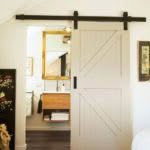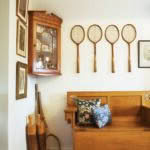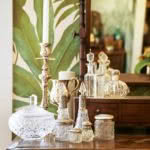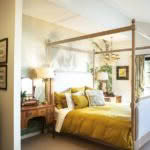The inspiring story of how this Lake Ōhau couple built The Barn from ashes
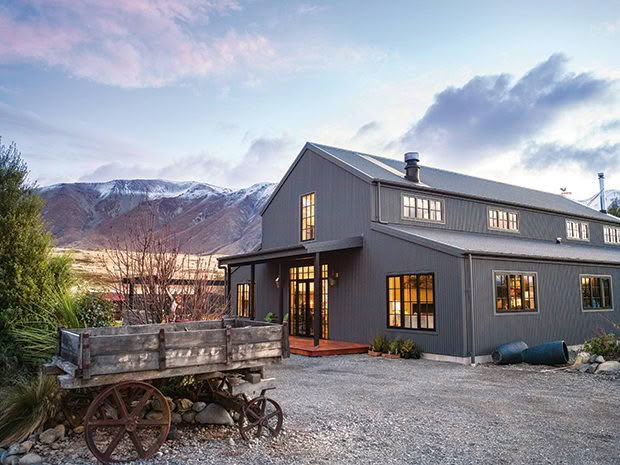
After fire destroyed their multi-generational holiday home and accommodation business, the family decided unanimously to build another barn-style home on the footprint of the burnt-out original.
In literature, a phoenix arises from the destruction of fire with gorgeous wings of red, orange, yellow and purple, a long feathery tail and eyes of sapphire blue. It is a perfect metaphor for the new home of a family who lost everything in the 2020 Lake Ōhau fires.
Words: Kate Coughlan Photos: Rachael McKenna
Hugh Spiers and his partner Dwayne Rennie, Hugh’s father, Chris, and mother, Rae, Hugh’s niece, 18-year-old Holly and two cycle-trail guests didn’t know they were running for their lives when they hastily left home at 3am on 4 October 2020. A frantic landline call from a neighbour in the tight-knit community of Lake Ōhau Alpine Village had alerted them to a big fire coming from the northwest.
Should they hunt around for their cat or leave a window open for her? Worried about getting ash inside their beautiful home, they carefully shut all the windows. Should they pack essentials? Presuming they wouldn’t be gone long, they took phones and iPads on which to pass the time before the curfew would be lifted and they could return home.
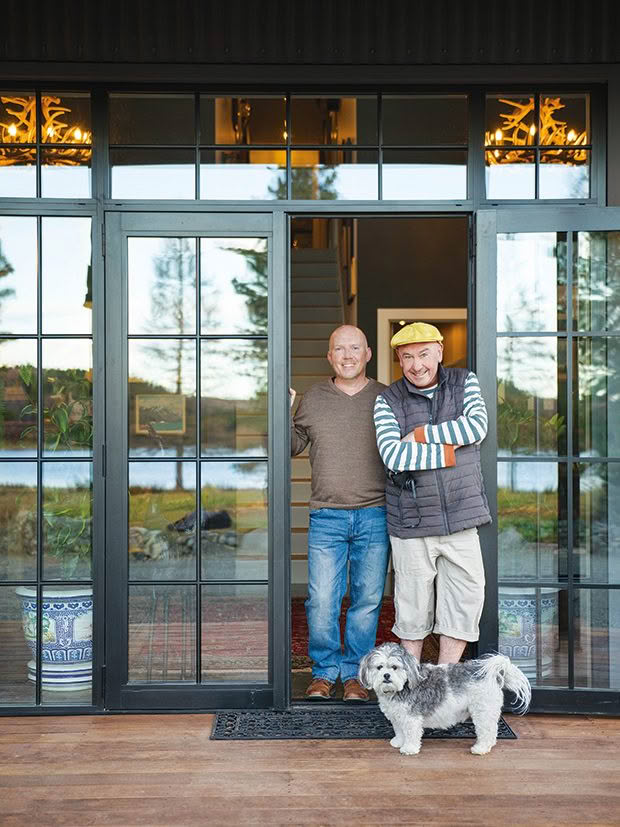
Dwayne Rennie (left) and Hugh Spiers’ property, The Barn at Killin, overlooks Lake Middleton near Lake Ōhau. Tay, the bichon shih tzu cross, gets his name from Loch Tay in a forebear’s Scottish home county of Perthshire. Killin is named for a village on the shores of Loch Tay.
As they left, four cars in a convoy, they didn’t know they’d never return home. Not ever to that home. The event’s enormity became clear as they met a solid wall of fire in their drive, fanned by 170-kilometre-an-hour winds. They turned, driving cross-country beneath trees and around the small Lake Middleton, to escape south. On that lung-searing, eye-watering, smoke-filled night of roaring wind and leaping flames, the time of the most destructive fire in recorded New Zealand history, 48 houses were destroyed as fire swept across 5500 hectares.
It is painful to recollect. They didn’t know what had happened to Hugh’s father for many hours. He had been forced to abandon his Jeep, stuck on a tree stump, and flee on foot. With two artificial knees (both needing replacement), he’d made it halfway up a bank and was hiding from the flames when found by a firewoman who he mistook for an angel. Her less-than-heavenly instruction that they had to get the hell out of there and be bleep-bleep quick about it made him realise she was no celestial being.
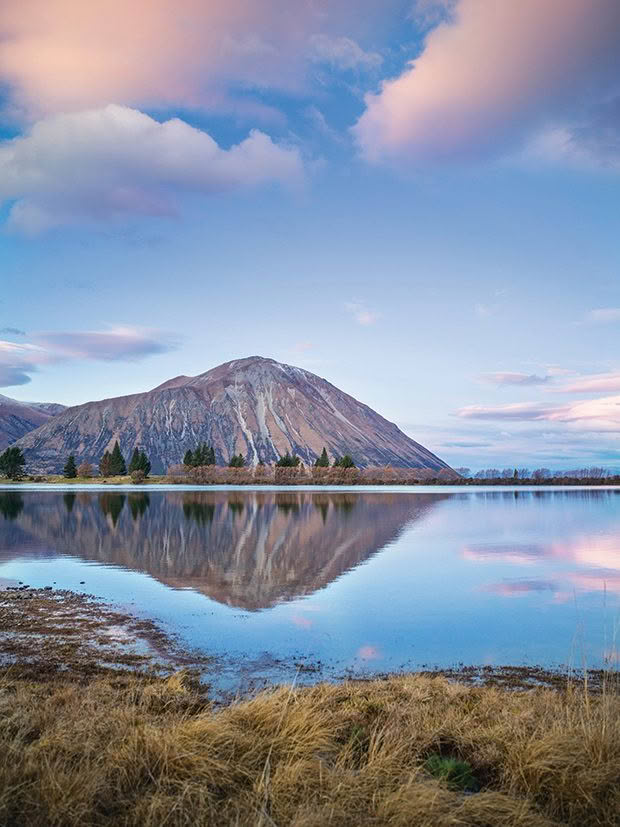
Lake Ōhau, in the centre of the McKenzie Basin, is one of the country’s least populated lakes.
They do not like having to relive that night or its aftermath. But in Hugh and Dwayne’s world, there’s always a silver lining: while it was the most significant loss of housing ever in this country, no life was lost. “That means everything,” says Hugh. “When our Lake Ōhau community reaches out to other disaster-struck communities, as we do every time such a thing happens, we are aware we didn’t lose lives. We can say, ‘Things will gradually get better, don’t despair’ but we don’t know how it is to have lost neighbours. We are so lucky in that regard.”
Hugh is the fifth generation of his family to have lived on land near Lake Ōhau since the pioneering days when his forebears — eight Downie sisters — married eight local runholders around the Hakataramea Valley and Lake Ōhau areas. Another of Hugh’s ancestors (his great-great-grandfather), the appropriately named Lake Falconer Ayson, petitioned for and released salmon in New Zealand. In 1899, Ayson became the country’s inaugural chief fisheries inspector and successfully stocked the Hakataramea and Waitaki Rivers (among others) with quinnat (chinook) salmon.
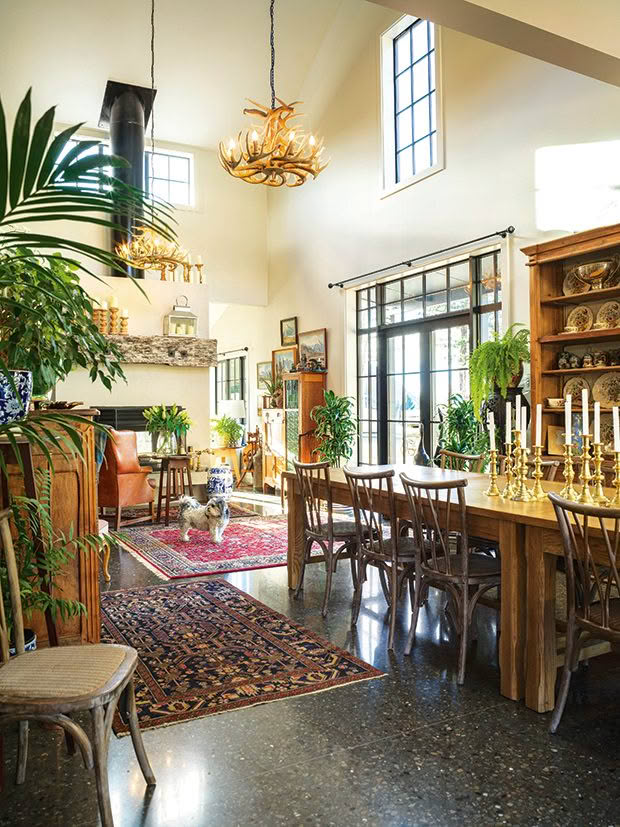
Hugh and Dwayne spent nearly two years hunting out décor items for their new barn. One of the few floorplan changes was a double-height entrance; light spilling through the open-plan living areas provides a wow factor. The antler chandeliers are faux. The heated concrete floors, made from local stone quarried from the old Ōhau riverbed, were darkened with oxide.
Dwayne’s love of this singularly stark mountainous land is learned rather than bred. He is the son of British army parents; his early years were spent hopscotching between Germany, Singapore and England before his family emigrated to New Zealand and settled in Hawera when he was 12.
He and Hugh met in Dunedin in 2004 and often holidayed on the shores of Lake Middleton at Hugh’s extended family’s holiday home on 20-odd hectares.
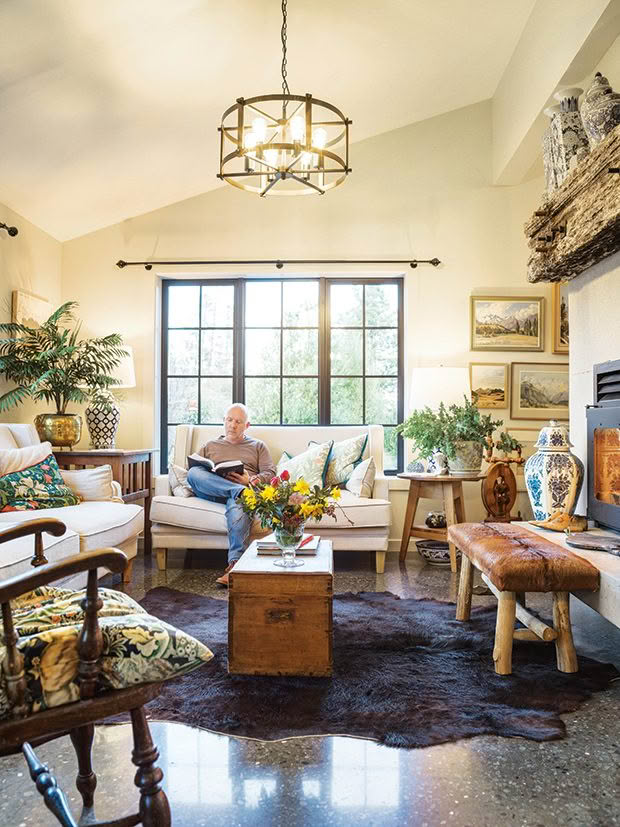
Morning sunlight floods the sitting room, a drawcard for guests, who also like to snuggle up to the double-sided Warmington fire for a pre-dinner drink. Dwayne, who put aside a career in business to work with Hugh, is a keen photographer, fascinated by the local landscape.
Even though the Spiers’ main home was in Port Chalmers, and he had lived in Dunedin City since becoming an adult, Hugh always felt he was coming home to Ōhau. In the early 2000s, his family decided to replace the old family caravan with a home for when all the family wanted to be there together: Hugh, his brother Lane and his sister Jacqui, her husband Guy and their two daughters. A steel-framed barn-style house was erected, built pretty much by Chris, a retired boatbuilder, fisherman and research vessel skipper, with the help of friends and family. The site overlooks Lake Middleton.
After the tragically young death of Lane in 2004, Chris and Rae decided to retire and move to the lake permanently.
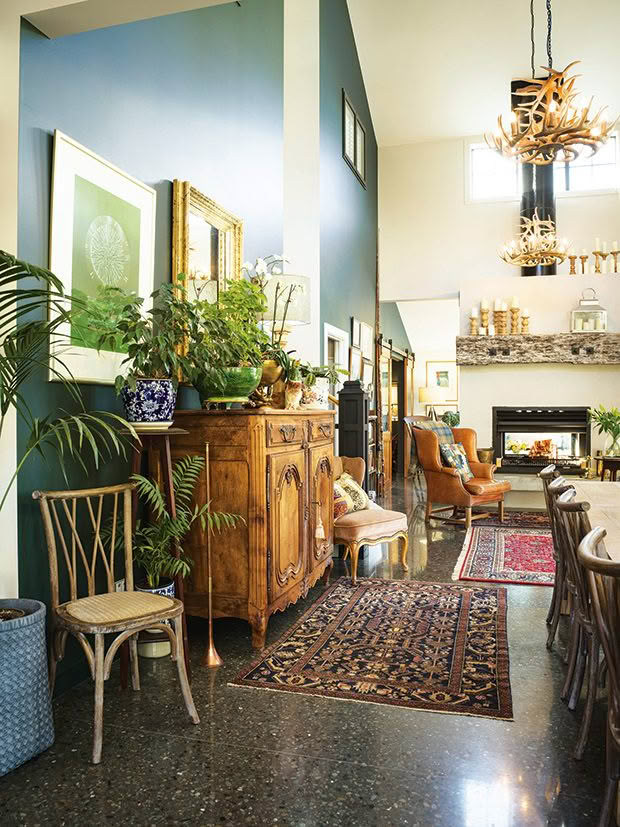
The cherrywood sideboard dresser in the dining room, dating to “one of the Louis”, came from an antique shop in Ōamaru, and Hugh is thrilled that such an ancient piece is in daily use.
It was the early years of AirBnB, yet the house was sought after by a growing number of Alps 2 Ocean cyclists. Hugh’s parents suggested he move up permanently to develop the accommodation as a business. He needed minimal persuasion and did so in 2017; within two years, Dwayne had also moved there.
So, there they all were on that night in October 2020, three generations of Hugh’s family (Holly finishing a season as a lift operator at the local Lake Ōhau Ski Field), with their first cyclists of the new season and a promisingly full schedule of bookings stretching ahead, all eager to have the barren days of Covid-19 restrictions behind them.
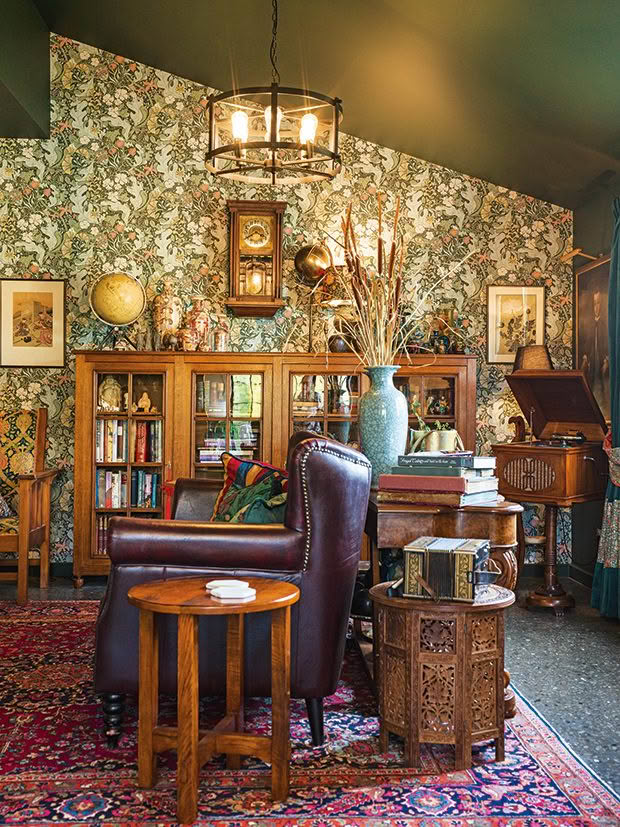
Hugh’s former career in homewares retail and his skill with a sewing machine means most of the home’s soft furnishings are his creation — either bought new, made from scratch or pimped-up found items. As their library shows, he and Dwayne both have a passion for the Arts and Crafts and William Morris aesthetic. Dwayne’s mother’s intricately carved wooden table (on the right of the image) was originally purchased in Singapore and travelled to her homes worldwide.
It took several days to get the fire sufficiently under control before a brief and restricted property visit was allowed to search for left-behind pets. The joy of Coco, the cat, leaping into Dwayne’s arms and Gladys the pet lamb’s smoke-affected croak of gratitude at the feed bottle Hugh had thoughtfully brought, didn’t alleviate their shock. A hellhole of charred wreckage remained where their large and treasure-filled home had stood. When Hugh told John Campbell on live television, “We went to bed in paradise and woke in fucking hell”, he meant it. The heat, estimated to be 2000 degrees Celsius, melted or incinerated everything, including the steel frames, to the extent that fire salvage experts had trouble recognising the building’s original two-storey construction.
What followed could only be endured; a challenging year of insurance claims and beginning the rebuild of their identities by replacing driver’s licences, bank cards and passports without any form of ID, convincing SKY’s call centre not to bother coming to collect the SKY dish…
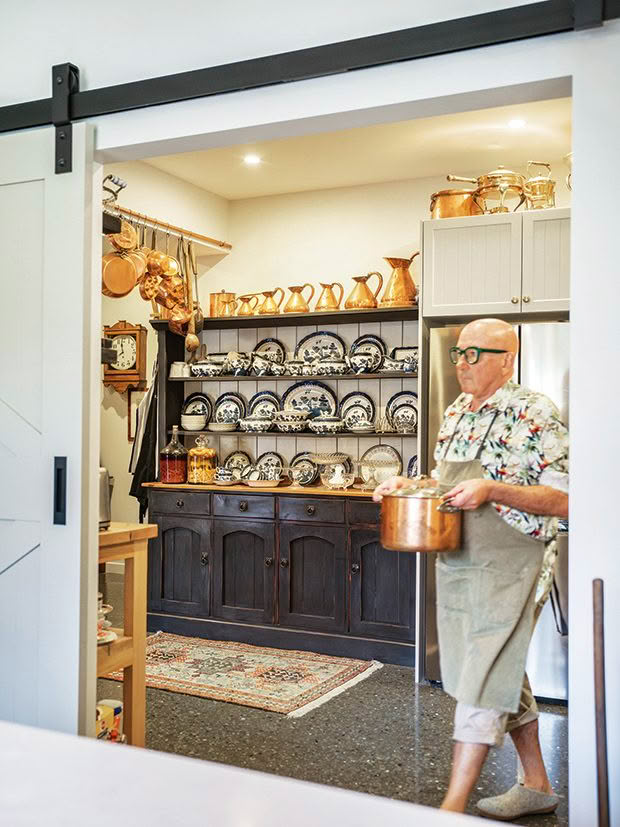
Hugh loves the warmth of copper kitchen utensils and was thrilled with this set of copper harvest cider jugs found at Provincial Antiques in Milton.
“What part of total destruction by fire do you not understand?” they asked more than once while trying to cancel guests’ bookings and being unable to access booking services. “Please don’t put me on hold,” they begged countless times to call centres as they tried to explain their predicament. Of course, one forgets passwords and usernames in these circumstances. Having had them neatly stored in tidy files by the computer didn’t help when a 2000°C blaze came through.
But as good as Hugh is at seeking silver linings, Dwayne is at managing a process. He can sit for hours at a time, every day for months, visualising and listing the exact contents of every cupboard in the 350-square-metre house and each storage unit in the garage – not only their possessions but those of Hugh’s parents. Day after day, he worked at it.
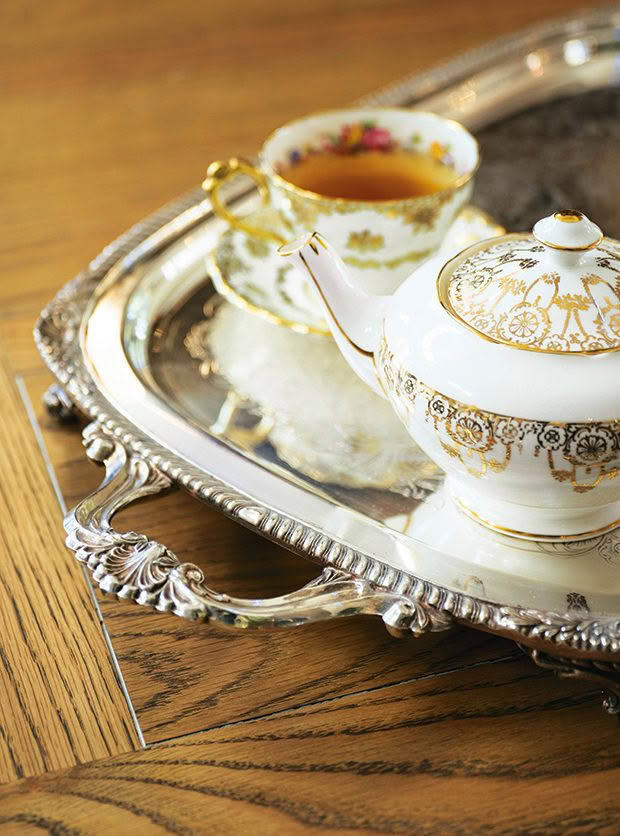
They can’t recall in which of their many favoured antique and junk shops they found the silver tray, but the teapot came from one of Hugh’s aunties and the teacup from another. “When you grow up in rural areas, you often have ‘aunties’ who are not related to you.”
The completed insurance claim totalled 44 pages of small-type double-sided spreadsheets with lists of possessions itemising the date of purchase, price and evidence of existence.Previous guests helpfully supplied photographic evidence of lost treasures that serendipitously had been captured in snapshots of happier days.
“We were well insured, which had cost us dearly over the years, but it proved its worth,” says Dwayne. The family unanimously chose the policy option of total replacement and managed rebuild and feel nothing but gratitude to Christchurch company M2 Developments, which their insurer contracted to do the rebuild. It took 777 days.
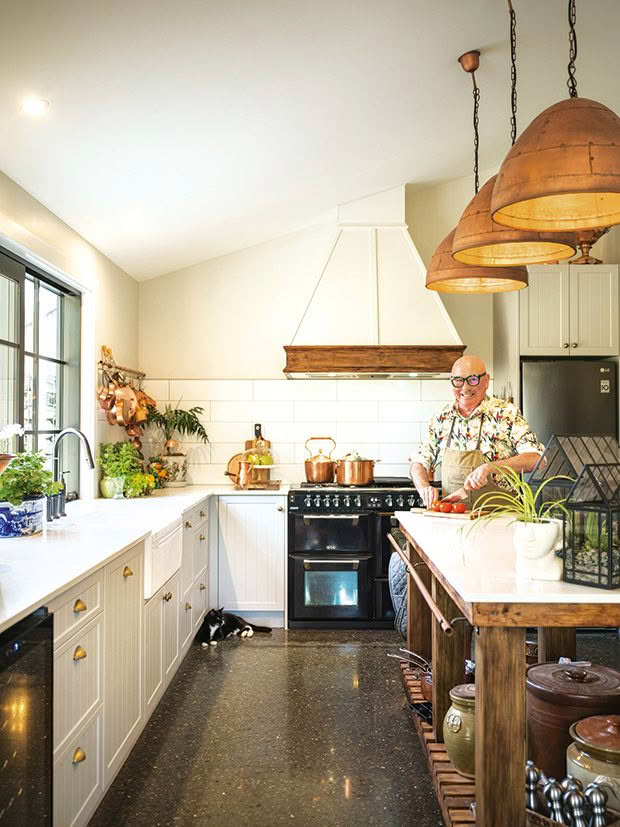
Hugh does most of the cooking, though allows Dwayne to do his speciality of duck-fat roast potatoes, and he learned the art of whipping up a feast from his mother and grandmother. “They could feed a crowd with limited freezer and pantry ingredients. We are a family of home foodies who’ve always valued special times with food, family and friends.”
Hugh and Dwayne, living in a rented house nearby (as were Hugh’s parents), encouraged the builders with lavish morning teas and lunches. An astonished truck driver, arriving on site with the new trusses, was met with French bubbles in a crystal goblet and hot sausage rolls served on a silver tray while the family wept with relief at such tangible progress.
“There are more good people than bad in this world,” says Hugh, “and we were blessed by the efforts of many good people. For example, the bulldozer driver clearing the site took time to stop his massive machine, climb down, and sift through rubble if he saw something glinting. He found a few charred relics — a watch a great uncle took to World War I and a few blackened rings. I could go on about so many more good people who reached out to help us.”
- Each of the four guest rooms, with ensuite, has a fancy name.
- The English Room sports a display of mahogany badminton racquets, a gut-stringed tennis racquet and croquet mallet, plus vintage riding boots.
- Downstairs, in the main bedroom, Marcia’s collection of cut-crystal and silver dressing room objects is set against a wall covered with Versace paper.
- The jungle-inspired mural with exotic birds and monkeys behind the four-poster bed came from The Inside in Nelson.
Perhaps no one more so than Marcia of Porirua, who became known to Hugh and Dwayne as The Lady in the Van. Marcia saw Hugh on television saying it wasn’t possible to buy even a pair of underpants in Twizel, where he and Dwayne were billeted at the time. She was downsizing, she told them, and she had a household of beautiful treasures that her children didn’t want. “So, I am bringing it all to you.”
As the new barn, on the exact footprint of the old one but with some tweaks and improvements, neared completion, Marcia appeared in a hired van with 18 boxes of household items — Dresden china and crystal decanters among them. Other friends and well-wishers also donated household items and treasures; a box of silverware sent by former guests arrived from Britain.
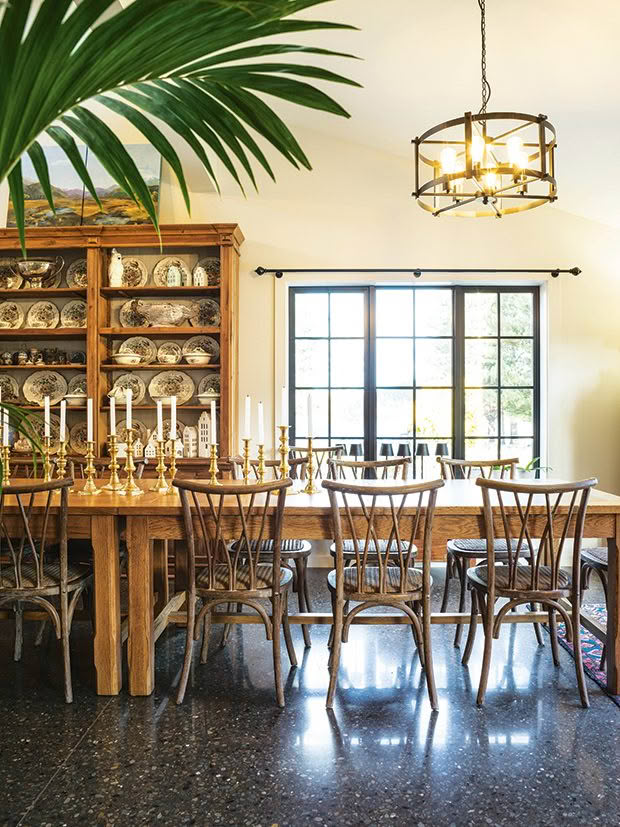
It’s not unusual for 24 guests to be seated on family occasions at the two american oak dining tables (from Oneworld Collections in Christchurch). One of several dinner sets (the 1930s pattern Hampshire by Royal Doulton) supplied by benefactress “Marcia of Porirua” takes pride of place in the upcycled baltic pine sideboard from Napier’s Rembrandt Fine Arts.
The miracle of it all is how much it feels that The Barn’s luscious and layered interior is the result of many decades, even generations possibly, of collecting. That’s just what this creative and clever couple hoped to achieve. Some guests have no idea there ever was a fire and presume this home and all its loveliness has grown slowly over the years. Sometimes Hugh and Dwayne are happy to save themselves from the emotional stress of retelling the story of the fire. They lived it, rose and are flourishing again, but there’s still a burn. See more at lakeohau.co.nz
WHAT HUGH AND DWAYNE LEARNED FROM THE LOSS OF THEIR HOME
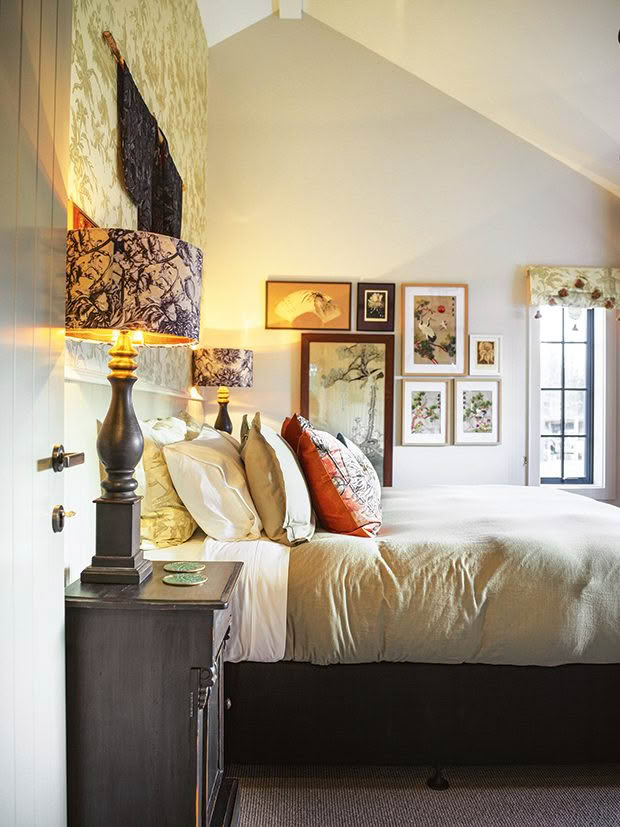
The Chinoiserie Room has views of the mountains in the north and east over the picturesque lake. The couple covered the wall behind the bed in fabric.
• Being well-insured is essential; you’ll wonder if you can afford it, but you can’t not. Make a list of everything you have but don’t keep it, or your receipts, on paper. Guess what? Paper burns.
• Walk around your home with a video recorder (your phone) and record all your possessions, paintings, glassware, china, linen and the contents of cupboards, noting everything you have, where you purchased it, and for how much.
• When retailers ask you to sign up for loyalty programmes, do it. They can tell you everything you’ve purchased from them by accessing your phone number. You won’t remember it all, but they will.
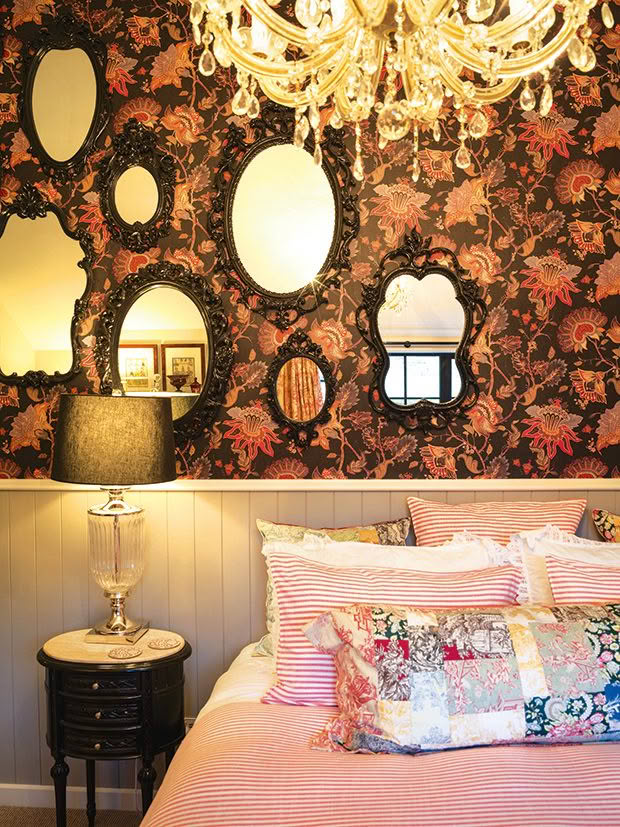
Hugh feels sorry for things that don’t sell at auction. “No one ever wants to buy these old nana mirrors, so I upcycle them by painting them in gold and repurpose them into little stories on the wall in the French Room.”
• Store all your valuable material in the Cloud, including usernames and passwords: ditto, any documents or photos.
• Such a dramatic event robs your ability to think clearly for quite some time, so make plans in case.
• We were lucky to have the support of our village, and we supported others too. We are all there for each other, and that helped. The way New Zealanders reached out with assistance helped, too, so don’t hold back when others face disaster. It does help.
Love this story? Subscribe now!
 This article first appeared in NZ Life & Leisure Magazine.
This article first appeared in NZ Life & Leisure Magazine.
